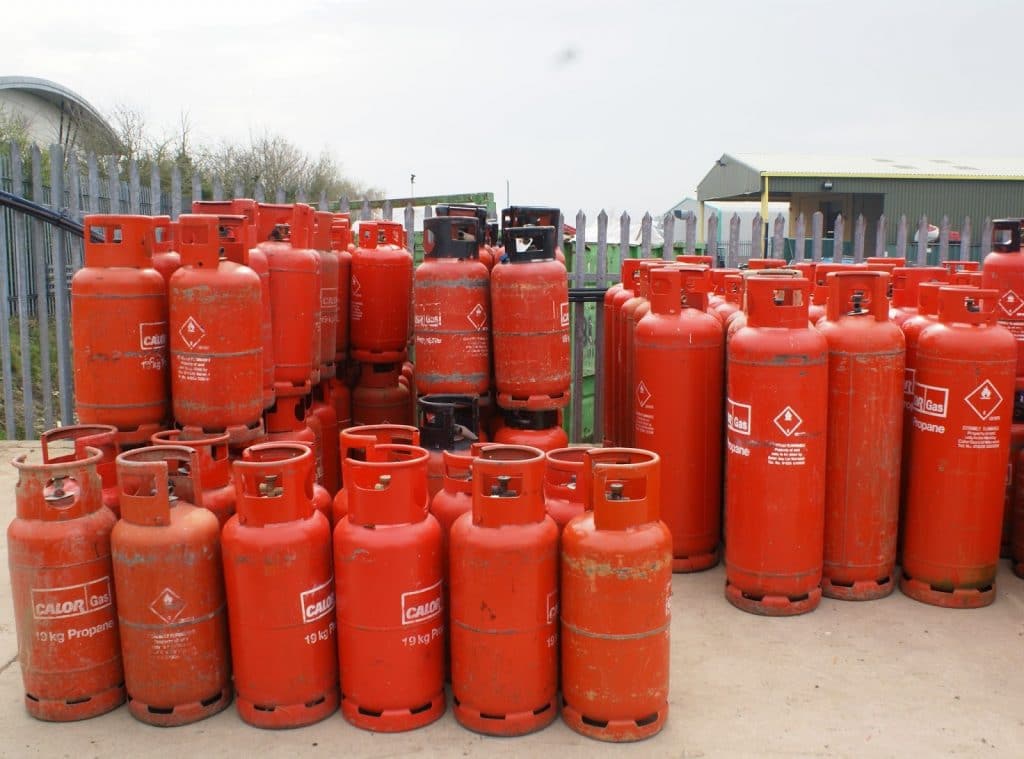Business
Cooking Gas Prices Soar by 114% as Naira Devaluation Worsens

The cost of cooking gas in Nigeria has skyrocketed by 114%, driven by the continuous devaluation of the naira, causing financial strain for households across the country.
This marks an astonishing 114% increase in just 16 months, aligning with the period of President Bola Tinubu’s administration.
The steep increase in LPG prices is linked to the depreciation of the naira, since the product is priced in U.S. dollars.
Since the naira was floated as part of Tinubu’s economic reforms, its exchange rate has deteriorated significantly, dropping from under N700 to approximately N1,700 per dollar.
Suresh Kumar, the Managing Director and CEO of NIPCO Plc, highlighted that more than 60% of Nigeria’s cooking gas is imported, rendering it largely reliant on exchange rates.
While speaking at the 2024 National Conference of the Nigerian Association of Liquefied Petroleum Gas Marketers in Lagos, Kumar highlighted that domestic LPG production is still inadequate to satisfy demand.
He encouraged the Federal Government to motivate Chevron and other companies to increase their conversion of propane into LPG, which could contribute to stabilizing prices.
“Presently, under 40% of the 1.5 million metric tonnes consumed domestically is produced locally. This underscores the need for government initiatives to encourage companies like Chevron to increase their conversion of propane into butane, which is more appropriate for domestic use,” he stated.
Our correspondent notes that due to the unstable exchange rate and the country’s dependence on imports, there are worries that cooking gas prices might keep increasing.
A report from the National Bureau of Statistics indicates that the average retail price to refill a 5kg cylinder of Liquefied Petroleum Gas rose by 4.19% month-on-month, increasing from N6,430.02 in August 2024 to N6,699.63 in September 2024.
Compared to the same period last year, this rose by 59.90 percent from N4,189.96 in September 2023.
According to the NBS, Rivers had the highest average price for refilling a 5kg cooking gas cylinder at N7,285.71 during state profile analysis. This was followed by Gombe with N7,271.88 and Borno with an average of N7,089.72.
Conversely, Kebbi reportedly recorded the lowest price at N5,950, with Kano and Benue following at N6,133 and N6,143 respectively.
The report stated that, furthermore, zone-wise analysis indicated the North-East had the highest average retail price for refilling a 5kg Liquefied Petroleum Gas cylinder at N6,929.02. This was followed by the South-East at N6,893.47, while the North-West recorded the lowest price of N6,382.30.
The report noted that the average retail price for refilling a 12.5kg cylinder of cooking gas rose by 4.89 percent month-on-month, from N15,552 in August 2024 to N16,313 in September 2024.
Compared to the previous year, this figure increased by 76.41 percent from N9,247.40 in September 2023. An analysis of state profiles showed that Rivers had the highest average retail price for refilling a 12.5kg cylinder of Liquefied Petroleum Gas at N17,993, followed by Gombe at N17,943 and Zamfara at N17,475.
READ ALSO: Ex-CBN Deputy Governor Tells Court Buhari Did Not Approve Naira Redesign
On the other hand, Adamawa had the lowest average price at N13,983. This was followed by Nassarawa and Bauchi with prices of N14,938 and N15,000 respectively.
According to the NBS report, an analysis by zone indicated that the South-East had the highest average retail price for refilling a 12.5kg cylinder of Liquefied Petroleum Gas at N16,957. This was followed by the South-West with a cost of N16,665, while the North-East recorded the lowest price at N15,770.75.
According to The PUNCH, the price of LPG has consistently risen from approximately N300 per kg in 2017 to about N1,500 by October 2024.
As a result of fuel subsidy removal and the floating of the naira, along with ongoing hardships, Nigerians have turned back to traditional cooking methods using firewood.
Concerns have been raised that the increasing cost of cooking gas could impede the nation’s efforts to promote clean cooking and decrease deforestation.
Samuel Nwanze, the Executive Director and Chief Financial Officer of Heirs Energies, stated that Nigeria requires $7.5 billion to achieve clean cooking by 2030.
Ola Oresanya, the Commissioner for Environment in Ogun State, mentioned to one of our correspondents that if LPG prices keep increasing, many people might turn to using charcoal for cooking.
According to the International Energy Agency, at least 500,000 African women die prematurely each year due to cooking with firewood, charcoal, or stoves.
According to the IEA, lack of access to clean cooking leads to loss of life among African women and their children.
The lack of energy access, especially for clean cooking facilities, is disproportionately affecting women and children.
It is estimated that each year, 500,000 women in Africa die prematurely due to insufficient access to clean cooking facilities.
According to the IEA, women may spend as much as four hours daily gathering firewood, which takes away their time and hinders their educational and professional goals.
